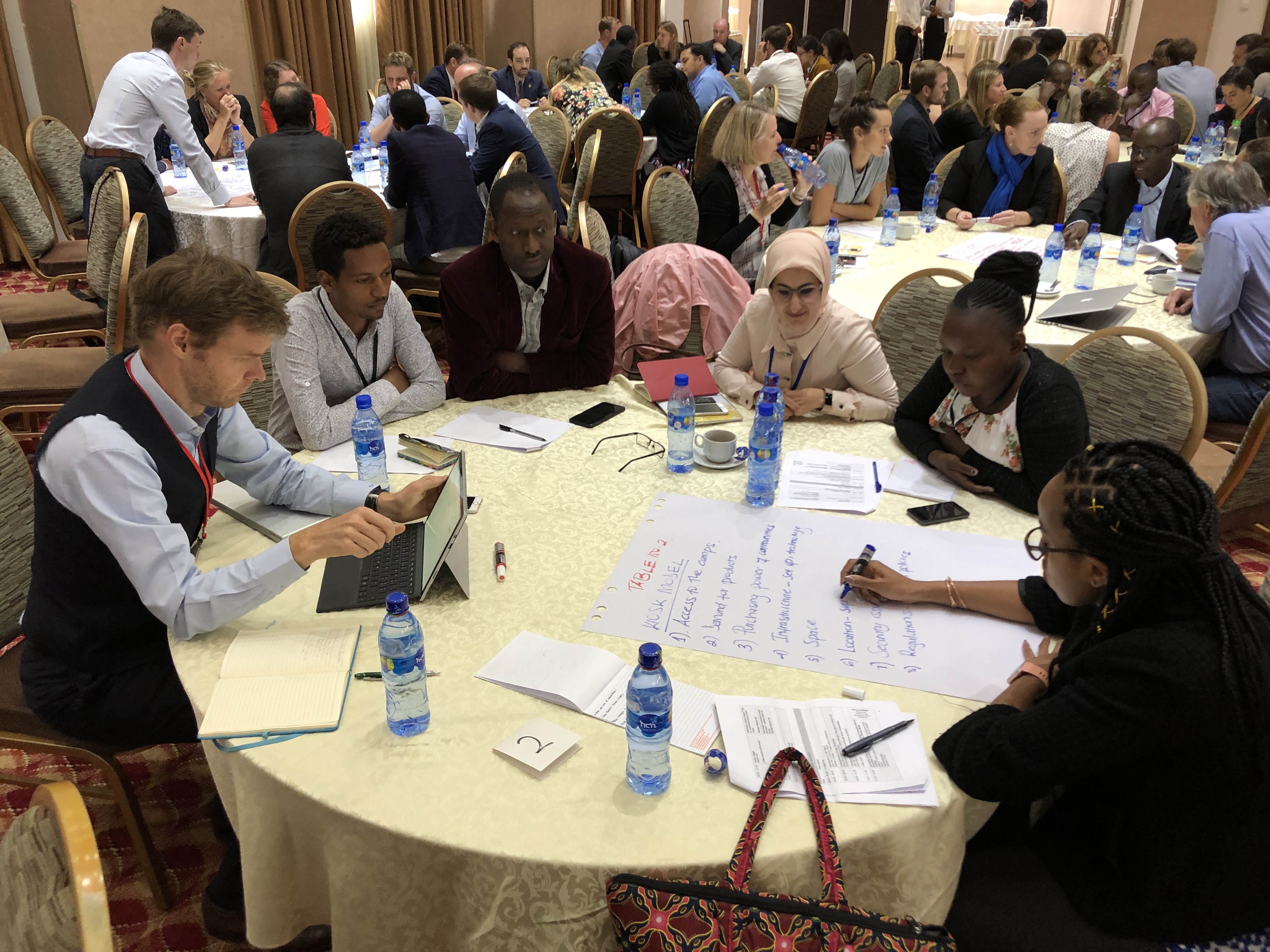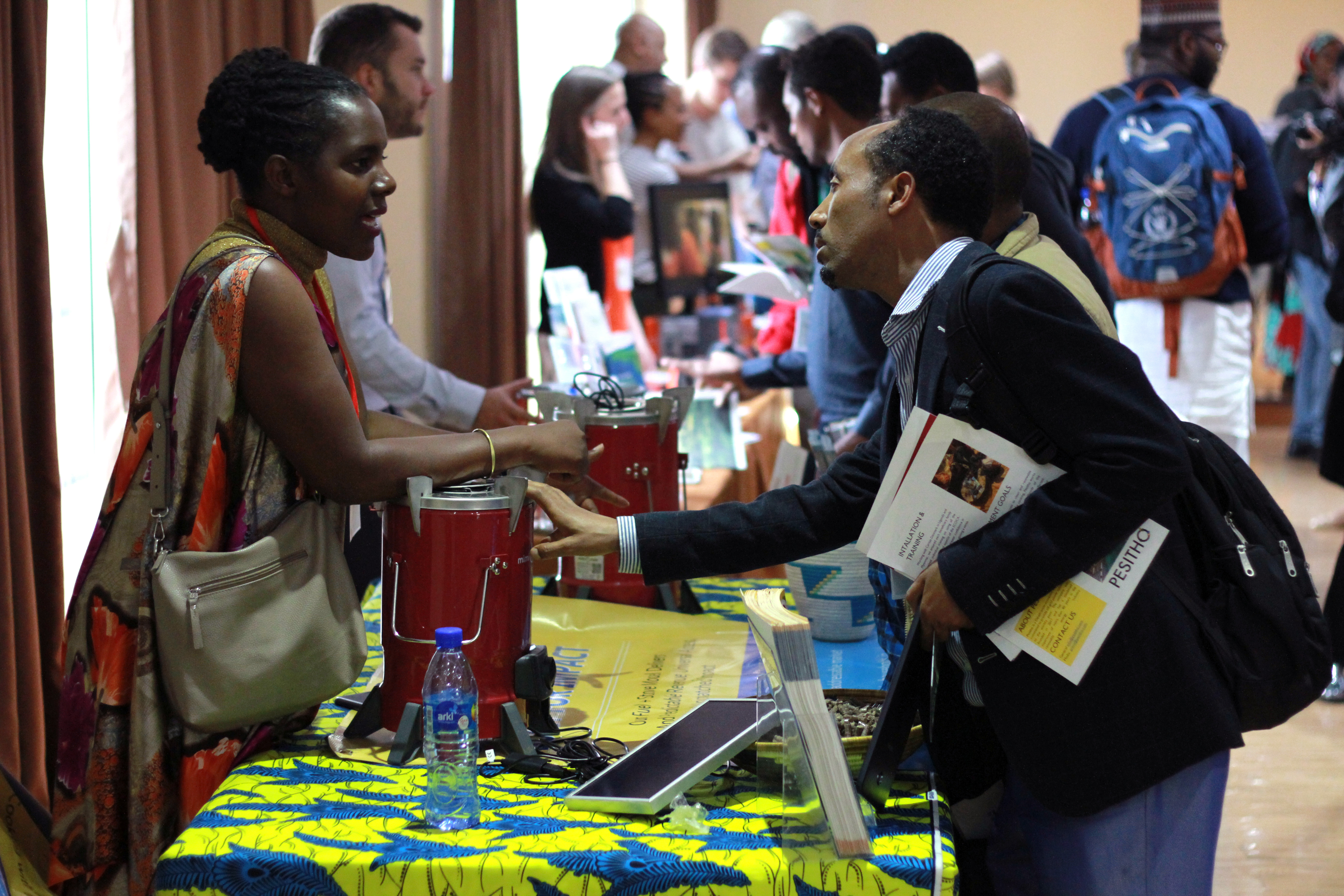Energizing Humanitarian Aid – The 2019 SAFE Workshop and Humanitarian Energy Conference
Access to energy for cooking, lighting, powering, communications, and other uses is increasingly being recognized as a basic need, not a luxury. While the humanitarian system has long struggled to bring energy assistance up to par with food, medicine, sanitation, and other basic services, this story is now changing. A diverse and growing community of actors is adopting innovative approaches to improve and expand energy access in humanitarian settings. This past month, over 180 representatives from 31 countries gathered in Addis Ababa, Ethiopia, for two events aimed at leveraging their collective expertise towards this goal. Both events were hosted by the Clean Cooking Alliance (the Alliance) and the UN Institute for Training and Research (UNITAR).
The Safe Access to Fuel and Energy (SAFE) Workshop (July 29-30, 2019)
The SAFE Workshop is an annual event that trains practitioners working with crisis-affected populations on how to integrate energy into their work. The Alliance has hosted the workshop since 2014 in partnership with other members of the SAFE Humanitarian Working Group, an international consortium of agencies working to facilitate more coordinated, predictable, and timely responses to the fuel and energy needs of vulnerable populations. Traditionally, the workshop was designed for humanitarian actors and energy experts, but participation from private companies, governments, researchers, and other actors has consistently increased each year since 2016.
With this in mind, the Alliance and UNITAR designed a more comprehensive and strategic curriculum for 2019, with two primary objectives: (1) provide participants with the fundamental knowledge, principles, and best practices needed to implement successful energy solutions in humanitarian settings; and (2) promote mutual understanding and trust between representatives from different sectors through peer learning. Over two days, participants engaged in small group problem-solving activities. They explored unfamiliar roles in a simulated humanitarian response exercise, exposing them to the complex problems that often arise in the field, and worked through case studies to learn best practices in needs assessment; monitoring, evaluation, and learning; program design; and implementation.
“The technology is not the point.”
In contrast to previous SAFE workshops, the 2019 curriculum featured very little content on specific energy technologies and fuels. “The biggest mistake we have seen implementers make over and over again, is prioritizing the solution over the method for delivering it,” said Kathleen Callaghy, the lead facilitator from the Alliance. “The technology is not the point. The most efficient light or the cleanest stove and fuel won’t make a difference if it isn’t used. It has to be appropriate to the population’s needs. There is no one-size-fits-all.” The workshop was therefore designed to provide participants with the fundamentals of good programming and subsequently direct them to additional resources and experts who could provide greater technical knowledge.
The busy two days ended on a positive note, with reflections from participants on what they learned. “I know now that the problem I have is not just my country – it is everywhere,” said Tina Aduke Olayemi, Executive Director of the Samaritan Care & Support Initiative in Nigeria. “Most of our women are killed in the bush when they go to get firewood, and we wonder what to do about it. This [approach] is bringing change to our society; we are learning.” Several participants expressed appreciation for the participatory format and the opportunity to meet and exchange knowledge with a diverse group of people.
The Humanitarian Energy Conference (HEC) (July 31-Aug 1, 2019)
Alongside the 2019 SAFE workshop, the Alliance and UNITAR established the first Humanitarian Energy Conference (HEC) to serve as the seminal forum for the entire community of actors working to improve and expand energy access for crisis-affected people. The impetus for HEC grew out of the Global Plan of Action for Sustainable Energy Solutions in Situations of Displacement (GPA), launched in 2018, which laid the groundwork for collective action on this issue. The GPA also set a common vision: that every person affected by conflict and natural disaster will have access to affordable, reliable, sustainable, and modern energy services by 2030 – a deliberate reference to Sustainable Development Goal (SDG) 7.
The conference began by setting humanitarian energy access in the greater context of international aid and development. “Access to energy is a cross-cutting theme that has impacts on protection; food security; health; environment; sexual and gender-based violence; water, sanitation, and hygiene; and education,” said Vincent Parker, Deputy Country Representative for the UN Refugee Agency (UNCHR) in Ethiopia. His comments echoed one of the major themes of the conference – that energy is not an end in and of itself, but rather a key enabler of impacts across multiple sectors. “There is no way that we can achieve SDG 7 if we don’t think about how displaced people are cooking their food,” said Alliance CEO Dymphna van der Lans, highlighting the need to bring development, humanitarian, and private sector approaches together on this issue. Additional remarks were given by Addisu Kebenessa, Deputy Director of the Ethiopian Agency for Refugee & Returnee Affairs (ARRA), Jacopo Damelio, Deputy Representative to Ethiopia for Food and Agriculture Organization (FAO) of the UN, and UNHCR Ethiopia Energy Officer Deribe Gurmu.
Inclusivity in every sense
Inclusivity, an oft-used but rarely understood byword in humanitarian discourse, constituted another major theme of HEC. In this case, it referred to two major imperatives: (1) involving crisis-affected and host communities as partners (rather than beneficiaries) in the design of energy solutions that impact their lives; and (2) encouraging humanitarian practitioners to work with a greater diversity of partners, such as the private and development sectors – a key component of Core Commitment #4 in the Agenda for Humanity.
Putting these goals into practice remains challenging, and participants were invited to contribute their own experiences in participatory sessions throughout the conference. Martha Thompson, a humanitarian innovation specialist and member of the Massachusetts Institute of Technology (MIT) D-Lab’s Rethink Relief program, led an exercise to analyze the participation of affected populations in sample energy projects and programs. “It’s important to think about who is at the table when decisions are being made because those voices are going to define the answers,” said Thompson, highlighting the possibilities for further inclusion and noting challenges in this process.
Pathways to mutually beneficial partnerships between humanitarian and non-humanitarian actors were discussed in several sessions. Javier Mazorra, Coordinator of the Alianza Shire multi-stakeholder partnership for energy access in refugee camps, and Katrina Pielli, USAID co-chair of the Smart Communities Coalition, led a plenary session on humanitarian and private-sector partnerships. Participants were invited to map out challenges and propose solutions for the implementation of three potential pathways for private sector engagement in this space: (1) bulk sale of products to humanitarian agencies (procurement); (2) direct sale to crisis-affected people in their communities (the “kiosk” model); or (3) provision of fuel or energy services to an entire community (the utility model). “Public sector, private sector, humanitarian organizations, universities, everyone has different backgrounds,” said Mazorra. “The key for successful multi-stakeholder partnerships lies in each actor contributing its own core skills and capabilities.”
Kate Montgomery of Acumen Fund continued this theme in a subsequent session on innovative finance, addressing the need to go beyond donor-based funding. Referencing sustainable business models piloted by social enterprises such as d.light, Biolite, and Burn Manufacturing, Montgomery highlighted the opportunity to support the expansion of these models in humanitarian settings through innovative finance mechanisms, including results-based financing, equity, debt, guarantees, and climate financing. Challenges towards implementing such options were raised in a moderated discussion with participants, including the need to de-risk investment, the limited and bureaucratic processes through which humanitarian agencies can currently engage the private sector, and the ethics surrounding the use of public funds to incentivize eventual profit-making endeavors. “This [discussion] won’t change everything,” Montgomery stated at the close of the session, “but it urges people to take risks, try new things, and learn from each other.”
Participation toward tangible actions
In addition to the sessions mentioned above, HEC participants engaged in fishbowl-style discussions, small group exercises, and co-creation workshops on humanitarian energy access with reference to holistic programming approaches, cash-based assistance, capacity building, protection, environment, electrification, and cooking. Overall, participants expressed appreciation for the dynamic and participatory style of the event. At the close of the last day, attendees were asked to reflect on what they gained from the conference and to write a message to their future selves (to be delivered by email in one month) with a reminder about what next steps they would take in their work as a result of the conference. The Alliance and UNITAR will produce a full conference report by the end of 2019, which will include the solutions proposed in each session and provide recommendations for advancing the conversation on humanitarian energy further in future events.
For more news on these events, follow @SafeFuelEnergy or search the hashtags #HEC19, and #HumanitarianEnergy on Twitter!
Click to read the 2019 SAFE Workshop official event report and the HEC official event report.
The Alliance and UNITAR are grateful to Megan Gerrard, Katie Gross, and Stefan Häfner for their facilitation of both events, as well as to our partners at Gaia Clean Energy, Practical Action, the International Lifeline Fund, Mercy Corps, UNHCR, RedR UK, the World Food Programme, FAO, Acumen Fund, Alianza Shire, USAID, and various volunteers who dedicated their time and knowledge to make the SAFE Workshop and HEC a success. The hosts also extend their deepest appreciation to the Norwegian Agency for Development Cooperation (Norad) and Shell International for their generous support of both events.


